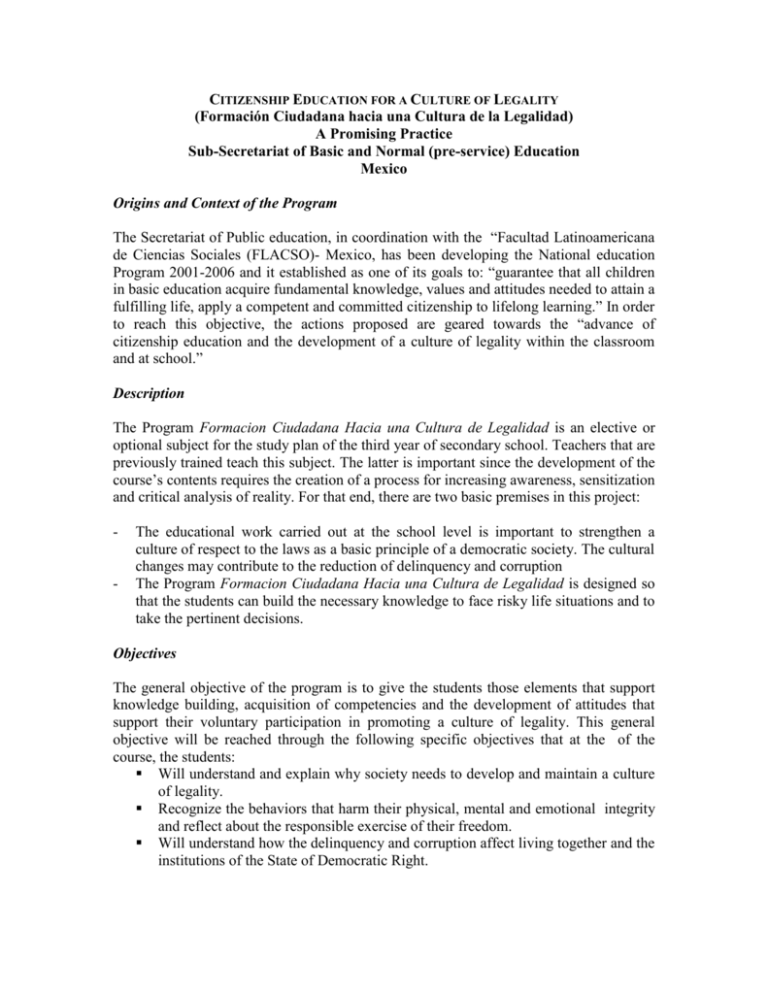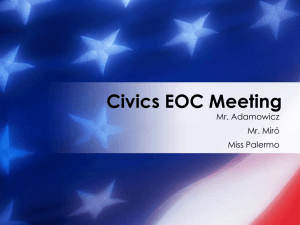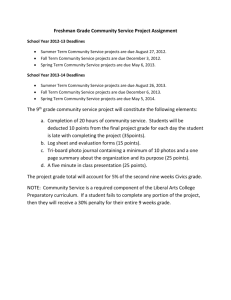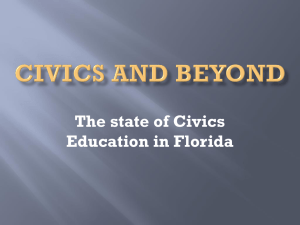CITIZENSHIP EDUCATION FOR A CULTURE OF LEGALITY
advertisement

CITIZENSHIP EDUCATION FOR A CULTURE OF LEGALITY (Formación Ciudadana hacia una Cultura de la Legalidad) A Promising Practice Sub-Secretariat of Basic and Normal (pre-service) Education Mexico Origins and Context of the Program The Secretariat of Public education, in coordination with the “Facultad Latinoamericana de Ciencias Sociales (FLACSO)- Mexico, has been developing the National education Program 2001-2006 and it established as one of its goals to: “guarantee that all children in basic education acquire fundamental knowledge, values and attitudes needed to attain a fulfilling life, apply a competent and committed citizenship to lifelong learning.” In order to reach this objective, the actions proposed are geared towards the “advance of citizenship education and the development of a culture of legality within the classroom and at school.” Description The Program Formacion Ciudadana Hacia una Cultura de Legalidad is an elective or optional subject for the study plan of the third year of secondary school. Teachers that are previously trained teach this subject. The latter is important since the development of the course’s contents requires the creation of a process for increasing awareness, sensitization and critical analysis of reality. For that end, there are two basic premises in this project: - - The educational work carried out at the school level is important to strengthen a culture of respect to the laws as a basic principle of a democratic society. The cultural changes may contribute to the reduction of delinquency and corruption The Program Formacion Ciudadana Hacia una Cultura de Legalidad is designed so that the students can build the necessary knowledge to face risky life situations and to take the pertinent decisions. Objectives The general objective of the program is to give the students those elements that support knowledge building, acquisition of competencies and the development of attitudes that support their voluntary participation in promoting a culture of legality. This general objective will be reached through the following specific objectives that at the of the course, the students: Will understand and explain why society needs to develop and maintain a culture of legality. Recognize the behaviors that harm their physical, mental and emotional integrity and reflect about the responsible exercise of their freedom. Will understand how the delinquency and corruption affect living together and the institutions of the State of Democratic Right. Duration, Coverage and Target population The program was designed to run from the year 2001 to 2006, however the goal is to have a permanent program within the secondary school level curriculum. Presently the program operates within six federal entities, but it is expected that as of 2006 it will be operating in at least 20 of the 30 federal entities The program targets students from the third year of secondary school. Educational Components - Curriculum The program is supported by a the Teacher guide that has four chapters (divided in 22 themes): I. Culture of Legality: The objective is that students build and reflect about the concept of culture of legality, about the characteristics that makes us human and individuals, as well as the meaning and importance of norms and values for living in together in society, II. The Rule of Law and the Culture of Legality: The emphasis in this section is about the Rule of Law. The students learn what it consists of, how to recognize it and why it is important to protect it. They may have the chance to realize that there are injustices confronting these norms and laws and that they themselves can bring change. The main focus will be how and why it is necessary to maintain a culture of legality III. Crime and Corruption: Enemies of the Culture of Legality :It deals with the harmful effects brought about by organized crime to the individuals involved as well as to their families, friends and society. The students will learn what organized crime is, how it works, how it attracts new members and why it represents a threat to society in general. Moreover, students will start to reflect about the legal and institutional means to combat delinquency. IV. Promoting a culture of legality: This last section allows the students to see their role in the promotion and support of the Rule of Law. They are motivated to be against organized crime and its activities. Students are motivated to think about their own future and on the consequences of the decisions they make. Lastly, they learn techniques to solve problems to help them to overcome the obstacles they face when in search of their goals. - Pedagogy and Teacher preparation This subject is taught by teachers that have been previously trained, since the program’s content development requires the generation of processes of raising awareness, sensitization and critical analysis of reality. - Materials Teacher’s guide developed by the teachers of Baja California and reviewed by staff from the General Administration of Educational Methods and Materials, from SEByN. As part of the supporting didactic materials there are two videos that are presented in the following order during the course: Bueno Muchachos (Good Guys) from Martin Scorcese Garo Ghazarian (testimonial participation) In addition, in the beginning of the course, students and teachers receive the book “The Lord of the Flies” from William Golding, a basic text from which many discussions and activities can be derived for teachers to use them in the classroom as practice. Strengths The educational work carried out by the school is important to strengthening a culture of respect for the laws as a basic principle in a democratic society. The cultural exchange can contribute to the reduction of delinquency and corruption Provide the knowledge of a culture of legality and the Rule of Law to contribute to the development of democracy. Support a critical and responsible attitude among the youth, specially facing the risks of corruption and organized delinquency, and in social environments of high risk with the presence of anti-social factors. Challenges To have incorporated the Program in secondary schools in 20 federal entities by 2006 Maintain its optional and flexible character (do not change it into a general and mandatory subject) Establish evaluation and follow-up strategies. Consolidate the state technical groups that can follow up the schools and guarantee the sustainability of the program. Evaluation The State of Baja California evaluates the program annually. The Sub-Secretariat of Basic and Normal (In-service) Education of SEP intends to carry out an evaluation for the year 2004 but the latter will depend on the financial resources available. CIVICS AND ETHICS EDUCATION (Formación Cívica y Ética) Subsecretaria de Educación Publica Mexico Why was this program selected to be shared with other countries? Because the program is on its fifth year of operation and it has passed the six-year term of the government from where the program had started. Description The program is a Civic and Ethics education program that takes into account not just its application in one subject but also the students’ school environment, the transversal application of various subjects and the everyday life of the students. Objectives The Civics and Ethics Education program has the goal to promote explicitly the civic and democratic values in the basic and secondary levels of education. Duration, Coverage and target population The program has been running for 5 years and in the 2004-2005 school year it will enter its sixth year of operation. The program has national scope and it targets students from primary and secondary and technical schools; in-service teachers; sector directors and principals of schools and scholars from teacher education schools. The program now has enriched its perspectives and it has been working at the primary level. For the primary level an experimental phase has been developed to sensitize and inform some schools together with teachers and educational teams of 14 entities in the country. A preliminary version of the contents is included in the subject Civics and Ethics Education. For the secondary level, there is a new proposal for the program in Civics and Ethics Education in the framework of the Comprehensive Reform of Secondary Education. Educational Components - Pedagogy and teacher preparation Regarding pre-service education, there is the inclusion of the modality Civics and ethics in the Teacher Education Program in Secondary Education (Plan 1999) as part of the Program Academic Changes and Strengths for the Teacher Education Schools (normales), for what there are also materials designed for each of the subjects that are part of this modality. There were two phases for in-service teacher development to implement the program, in 1999 and 2000 where the following materials were developed: - Materials Formación cívica y ética. Guía de estudio para profesores en servicio de escuelas secundarias generales, técnicas y telesecundarias, SEP, 1999. Formación cívica y ética. Guía de estudio para personal directivo de educación secundaria, SEP, 1999. Guía de estudio para la segunda jornada nacional de capacitación de profesores en servicio de escuelas generales, técnicas y telesecundarias, SEP, 2000. Guía de estudio para la segunda jornada nacional de capacitación para directores de escuelas generales, técnica y telesecundarias, SEP, 2000. Guía de estudio para la segunda jornada nacional de capacitación para jefes de sector de escuelas generales, técnicas y telesecundarias, SEP, 2000. Formación cívica y ética. Trabajemos algunos contenidos de los programas de estudio, SEP, 2000. Libro para el maestro. Formación cívica y ética. SEP, 2000 which has a guide for teachers. The program also relies on different print and audiovisual materials. The latter are categorized into different series such as “Civics and Ethics Knowledge at School”, “Specials in Civics and Ethics Education” and “Thoughts and Ideas in Civics and Ethics Education” Evaluation As part of the goals for the National Education Program 2001-2006, it there might be changes in the organization of secondary schools to strengthen the development of democratic school environments, where the goals of Ethics and Civic Education can also be met. .








